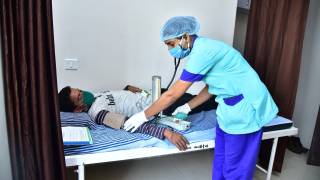Neutralizing Antibody Reduced COVID-19 Risk by 80% at Nursing Homes

An Indiana-based pharmaceutical firm announced Bamlanivimab (LY-CoV555) significantly reduced the risk of contracting symptomatic COVID-19 among long-term care facility residents and staff.
Eli Lilly and Company confirmed the Phase 3 BLAZE-2 COVID-19 prevention trial results suggest that residents randomized to bamlanivimab have up to an 80 percent lower risk of contracting COVID-19 versus residents in the same facility randomized to placebo.
The 965 participants who tested negative for the SARS-CoV-2 coronavirus at baseline (299 residents and 666 staff) were included in analyzing primary and key secondary endpoints for assessing prevention.
While the 132 participants (41 residents and 91 staff) who tested positive for the virus at baseline were included in exploratory analyses for assessing treatment, adding to the growing body of evidence for treatment with bamlanivimab.
After all, participants reached eight weeks of follow-up, there was a significantly lower frequency of symptomatic COVID-19 (the primary endpoint) in the bamlanivimab treatment arm versus placebo (odds ratio 0.43, p=0.00021).
All key secondary endpoints also reached statistical significance in both the overall and resident populations.
The results from exploratory analyses of viral load in the treatment group were consistent with previously disclosed data from BLAZE-1 evaluating bamlanivimab as an outpatient treatment for recently diagnosed COVID-19.
Among the 299 residents in the prevention group, there were four deaths attributed to COVID-19 at the time of death, and all occurred in the placebo arm. There were no COVID-19 attributed deaths in the bamlanivimab arm. Among the 41 residents in the treatment group, there were four deaths, and all occurred in the placebo arm, with none in the bamlanivimab arm. Over the entire trial, there were a total of 16 deaths reported, including deaths not related to COVID-19, and all deaths were residents (11 deaths in the placebo arm and 5 in the bamlanivimab arm).
All study participants were randomized to receive either 4,200 mg of bamlanivimab or placebo.
The BLAZE-2 study was conducted in partnership with the National Institute of Allergy and Infectious Diseases, and the COVID-19 Prevention Network (CoVPN).
Bamlanivimab 700 mg injection is authorized for use under an Emergency Use Authorization (EUA) for treatment of mild to moderate COVID-19 in adults and pediatric patients (12 years of age and older weighing at least 40 kg) with positive results of direct SARS-CoV-2 viral testing, and who are at high risk for progressing to severe COVID-19 and/or hospitalization.
"We are exceptionally pleased with these positive results, which showed bamlanivimab was able to help prevent COVID-19, substantially reducing symptomatic disease among nursing home residents, some of the most vulnerable members of our society," said Daniel Skovronsky, M.D., Ph.D., Lilly's chief scientific officer and president of Lilly Research Laboratories, in a press statement.
"These data provide important additional clinical evidence regarding the use of bamlanivimab to fight COVID-19 and strengthen our conviction that monoclonal antibodies such as bamlanivimab can play a critical role in turning the tide of this pandemic.”
“We're glad bamlanivimab is already available as a treatment for patients at high risk for progressing to severe COVID-19 illness or hospitalization, including those in nursing homes, and look forward to working with regulators to explore expanding the emergency use authorization to prevent the spread of COVID-19 in these facilities."
An independent data and safety monitoring board oversaw the BLAZE-2 trial. In the study, the safety profile of bamlanivimab was consistent with observations from the Phase 1 and Phase 2 trials.
Across multiple clinical trials, Lilly now has collected safety and efficacy data in more than 4,000 patients treated with bamlanivimab, either alone or administered together with another antibody.
"The results of this innovative study further support the belief that bamlanivimab – and potentially other monoclonal antibodies – can reduce symptoms and may even prevent COVID-19," added Myron S. Cohen, M.D., CoVPN co-principal investigator, and director of the Institute for Global Health and Infectious Diseases at the University of North Carolina at Chapel Hill.
"The antiviral activity seen with bamlanivimab treatment emphasizes the importance of early intervention to help counter the devastating impact the virus has had in this vulnerable population and other high-risk patients."
BLAZE-2 is a first-of-its-kind COVID-19 trial designed to evaluate this vulnerable population by addressing the challenging aspects of running a clinical trial in long-term care facilities, which normally do not conduct clinical trials. BLAZE-2 is ongoing as an open-label trial evaluating bamlanivimab alone or administered together with another antibody as a treatment for high-risk individuals (residents and staff) diagnosed with COVID-19 at these long-term care facilities.
The full results from BLAZE-2 will be presented at a future medical congress and submitted for publication in a peer-reviewed clinical journal.
For more information about the use of bamlanivimab, contact Lilly's 24-hour support line at 1-855-LillyC19 (1-855-545-5921). Patients and physicians can visit covid.infusioncenter.org.
Bamlanivimab has not been approved by the FDA for any use. It is not known if bamlanivimab is safe and effective for the treatment of COVID-19. Healthcare providers should review the Fact Sheet for information on the authorized use of bamlanivimab and mandatory requirements of the EUA.
Bamlanivimab is not authorized for use in patients who are hospitalized due to COVID-19, who require oxygen therapy due to COVID-19, or who require an increase in baseline oxygen flow rate due to COVID-19 in those on chronic oxygen therapy due to underlying non-COVID-19 related comorbidity.
There are limited clinical data available for bamlanivimab. Serious and unexpected adverse events may occur that have not been previously reported with bamlanivimab use. There is a potential for serious hypersensitivity reaction, including anaphylaxis, with the administration of bamlanivimab.
If signs and symptoms of a clinically significant hypersensitivity reaction or anaphylaxis occur, immediately discontinue administration and initiate appropriate medications and/or supportive care.
Lilly is a global healthcare leader that unites caring with discovery to create medicines that make life better for people around the world.
PrecisionVaccinations publishes research-based news.
Our Trust Standards: Medical Advisory Committee

























